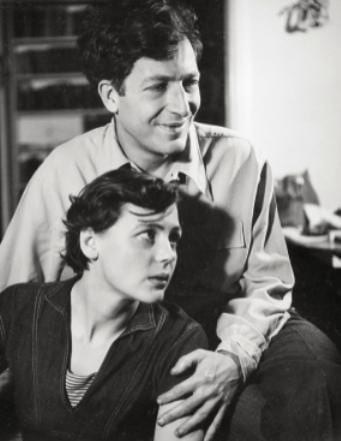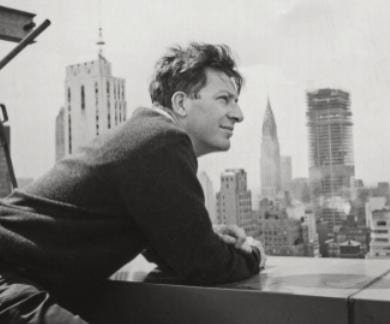
Paul Goodman with his wife, Sally. Credit: Promotional photo
It takes only one person to change your life. For first-time filmmaker Jonathan Lee, that person was queer writer and activist Paul Goodman.
Goodman — dubbed “the most influential man you’ve never heard of” on the poster for Lee’s new documentary about him — was a philosopher and pacifist who laboured in New York obscurity until the breakout success of his book Growing Up Absurd. Goodman embraced a fluid understanding of sexuality and a participatory, anarchist-style democracy long before Lady Gaga or Occupy Wall St were in vogue.
Lee first encountered Goodman’s words when he was 17 and in prep school preparing a series of teach-ins against the Vietnam War. “He just opened up all these worlds for me,” Lee says. “It was not until a couple of years into reading him that at the end of one of his books [I noticed] he started discussing his homosexuality.”
For Lee, growing up gay and political in small-town Maine, Goodman’s audacity was inspirational. “Paul Goodman helped me feel that I could be gay and also active as a citizen, fighting for my own rights but not only thinking about myself,” he says.
After taking Goodman’s philosophy as gospel for years, Lee decided to investigate Goodman’s story. “I realized that I just felt this need to make sense of what . . . that infatuation of mine had been about.”
Lee learned from Goodman’s literary executor Taylor Stair just how many people were influenced by Goodman’s work. “Again and again, these people would say to him, ‘Paul Goodman really changed my life.’” Lee decided to document Goodman not only through his work, but also through reflections of those close to him. “I left that lunch in 1988 never having thought about making a film before in my life, but I said to myself . . . I’m going to find a way to do it.”
It was a gutsy project. The film took eight years to develop, two of which were spent editing. Lee had only ever produced a series of short documentaries and had no prior directing experience. “Because I had no training, I had to get really good people,” he says, pointing to director of cinematography Ben Shapiro. Lee interviewed 42 people close to Goodman.
Lee heard stories that left him grappling with a new reality: the person whom he had regarded as a moral compass was, in fact, fallible.
“As a father and a husband, and as a person . . . he was sometimes not very nice,” Lee says. “He was very egocentric, he was self indulgent, he was hurtful.”
Goodman’s unabashed bisexual identity and discussions of sexual freedom — combined with the deep-seated misogyny of his time — left the relationship with his wife, Sally, sometimes strained.
“So much of his sexual drive was gay . . . that [Sally] was not the primary object of his sexual love,” Lee says. “I remember reading a poem of his . . . it was almost literally something like, ‘Goddamn it, I have to fuck Sally again because she wants a baby!’”
Goodman, who would often go cruising for men, was also jealous and would not let Sally have lovers of her own. “He was very dependent on her emotionally,” Lee says. “I think that’s why he didn’t want her to have affairs; he was afraid of losing her.”
Learning about Goodman’s mistakes allowed Lee to develop the critical thinking he’d so admired in his mentor. “When I was younger I would read some of his writing; I’d agree with everything he said. After a while it left me feeling like I didn’t have any of my own ideas — I thought, well I’ll just have to run to Paul Goodman,” Lee says, laughing.
Lee hasn’t lost his admiration but found it to be more rooted in reality. “I would not make this film . . . if I thought that his ideas weren’t valuable. I would not make the film only to show that he was a shit,” he says. “But I did feel that it was important to make this real.”
The Deets:
Paul Goodman Changed My Life
Opens Dec 30
Mayfair Theatre
1074 Bank St


 Why you can trust Xtra
Why you can trust Xtra


